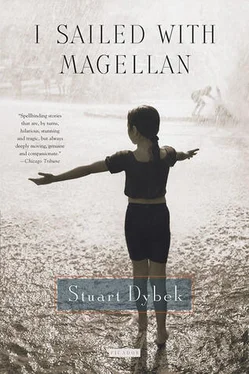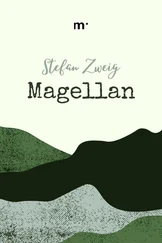We began to graze our way through the Lower East Side — a Caribbean place for conch fritters, a restaurant in Chinatown whose display window featured a swampy aquarium filled with croaking frogs, baby eels in olive oil at a tapas bar, giant clam in a basement sushi place, borscht at the Ukrainian National Home, Sicilian cheese cake at Venieros, palacsinta at the Veselka Coffee Shop …
Grazing through an evening was a private ritual carried over from the times I’d visited Mick in New Orleans, when we’d hike the city from restaurant to restaurant or drive into the Spanish moss-festooned countryside, to all-night truck stops serving Cajun food and zydeco joints in Delacroix on the bayou, where the oysters were fresh off the boat.
We were alternating rum and espresso on Mick’s yin-yang theory that an equilibrium could be achieved between alcohol and caffeine. By two a.m. we were speeding drunk. We hid our money in our shoes and, still schlepping my backpack, headed down Ninth, a street along which drugs bloomed like night flowers in the spring air. A shadowy gauntlet of dealers murmured, “Smack it up man, smack it up, dust dust, got what you need, got what you want, rambo, coke, sunshine …”
We bought a dime bag from a black kid singsonging “sens, sens, sensamilla,” and walked to a fenced park off Avenue A where a basketball game — as much a symptom of spring as lilacs — was going on by streetlight. In the shadows, three drummers beat congas and chanted.
“Does this weed smell like oregano to you? I hope we didn’t get rooked,” I said, employing one of Sir’s signature words for being taken.
“Hear that?” Mick asked, passing me the reefer he’d expertly rolled. “They’re chanting the name of Obatala, the supreme divinity on the terrestrial plane.”
“The terrestrial plane! No shit?”
“His day of the week is Sunday, his color the purest white. Sacrifice to Obatala requires a white female goat or a white canary.”
“And I always thought canaries were by definition yellow.” I took a drag and held in the smoke. It wasn’t oregano.
“His favorite fruit is guanábana, and unlike Chango, whose offering is always rum, Obatala hates alcohol. His water comes from rain.” There was no stopping Mick now. He could go on reciting the secret attributes of the gods for hours, just as he could recite recipes, historical facts, conspiracy theories, jokes, verbs in a half dozen languages …
Maybe it was the sens, but, after a few hits, my brother’s litany began to seem interconnected in a web of chant with the congaceros at its center. Car horns and sirens and shouts in the dark were part of it, too, threads of an invisible network of sound discernible in the way that the miles of spider silk connecting every weed and wildflower in a field become momentarily visible on dewy mornings at a certain angle of dawn. The rumble of traffic, the scuffle of gym shoes, the ball reverbing across asphalt, gonging off the metal backboard, and slithering through the chimes of the chain-link net, were a counterpoint to the drumbeat. It struck me then that such connections were the way Mick had come to perceive the world. He believed reality was coded and that there were wise men who could read its mysterious subtext, wizards who could discern the eternal designs beneath the daily chaos, shamans, all the grander for their humble surroundings, whose arcane knowledge could influence fate.
“This city is so fucking strange,” Mick was saying. “Look up and there’s all these lights and even though we’re at the edge of a dark ocean, not a single star. Empty skyscrapers squandering electricity just so everyone knows that in the undeclared capital of the modern world there’s power to burn, and here, just blocks away in the middle of junkie heaven and hell, they’re calling on the ancient Yoruba deities. It seems all the wilder and more primitive for the incongruity.”
There wasn’t much night left by the time we finally got to Mick’s flat on Delancey. Mick had told me about Leon, his deaf albino tom, but overlooked mentioning Mirza, so I wasn’t prepared for the sight of a woman asleep. The place seemed furnished in anarchy. A boom box resonated Latin music. Partially unpacked boxes spilled their contents, pillars of books piled against walls threatened to topple and bring the walls down with them. The only seats were at a kitchen table cluttered with empty bottles, plates that served as ashtrays, and dirty pots from some exotic feast Mick had cooked up, perhaps days ago. Beneath the table the eyes of Diablo the borzoi glared out like a wolf’s from its lair. But, unlike all of Mick’s previous disordered places, this flat smelled faintly floral. A bare mattress, crammed into what probably was meant to be a pantry, extended out beyond the doorway. A woman was asleep on the mattress, although given the surrounding mess, the blaring radio, the flickering fluorescent kitchen fixture, it seemed more likely that she was passed out. All I could see of her were long legs in black net stockings and red high heels — one red shoe, to be exact, the other presumably kicked off. The immobile perfection of those tawny legs sticking from the doorway made it appear wholly possible that my brother was bedding down with the bottom half of a mannequin. Mick didn’t seem to notice anything out of the ordinary.
“You didn’t mention a roommate. You sure it’s all right for me to crash here?”
“No problem. My girlfriend, mi amiguita, Mirza,” he said by way of introduction. “Mirza, meet mi ’mano, Perry.”
The legs didn’t stir.
“See,” he said. “She’s totally cool with it.” Then he dropped his voice. “If she asks how old I am don’t tell her.”
“Why not? Why would she ask me?”
“She’s very curious about my family. Don’t tell her anything. She’ll misinterpret it. We’re having our little squabbles lately.”
For what was left of the night, I slept in my clothes on a musty pile of drapes wedged between boxes on the bare floor, with Leon curled purring on my chest and Diablo snarling, his fangs bared at my throat each time I shifted, futilely searching for a comfortable position.
When I woke to Saturday, light was defogging the grated, unwashed windows. Leon sat perched on the refrigerator observing Mirza, who, dressed in a tank top and jogging sweats, stood at the stove with her back to me, whisking canned milk and cinnamon into a pot of coffee. From the pantry doorway, Mick’s bare, hairy legs stuck out over the mattress as Mirza’s had the night before. The radio played Bach, and the borzoi gnawed at something under the table.
“Buenos días,” Mirza said, glancing over her shoulder. I was struck by how broad her shoulders were. She had the build and muscle tone of a gymnast. Her kinky hair was cropped short, dyed bronze, a shade that matched her skin. She wasn’t pretty so much as beautiful in a handsome way.
“Good morning,” I said.
She handed me a steaming mug. “I can see the family resemblance. Especially in the cheekbones. You are Yimmy’s brother.”
“Whose brother?” I asked.
“Yimmy.”
I was groggy and wondered if Yimmy was some Caribbean term of endearment. “You mean Mick?”
“Mick? No, Yimmy. Yimmy Delacroix.”
“Yeah, mi hermano,” I said.
Not only had Mick neglected to tell me about Mirza but he’d forgotten to mention that in New York he was no longer Mick Katzek. Later, he’d clue me in that he’d changed his identity and assumed a stage name for his acting career. The name had belonged to an old Cajun he’d worked with on the boats out of New Orleans, a man without any family of his own who befriended Mick, taught him how to make gumbo on a galley stove, to tie nautical knots, to cable barges together without losing his fingers, and to play bourre, a mean card game with dramatically rising stakes. Bourre was played each payday on the docks, and Mick also learned the phrase— Je bourried la vie foutu— and the attitude that went with it: I bourried my fucking life. Delacroix’s heart gave out suddenly on one of their trips down the Gulf Coast, and he was buried in the Seaside Cemetery in Corpus Christi, in a pauper’s grave beneath a marker on which the date of neither his birth nor death appeared. It simply read: JAMES DELACROIX OF LOUISIANA.
Читать дальше












